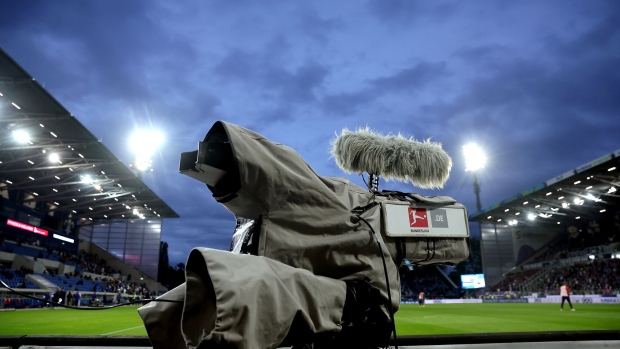Jul 4, 2024
Eintracht Frankfurt CEO Sounds Alarm After Failed Bundesliga Media Deals
, Bloomberg News

(Bloomberg) -- Germany’s professional football league is facing a serious fallout from a potentially delayed or failed sale of broadcasting rights, according to a senior league executive.
“Should we not be able to enforce our prices, should there be a decline in broadcasting proceeds, German clubs will have difficulties maintaining their status,” Axel Hellmann, chief executive at Eintracht Frankfurt and member of the DFL Deutsche Fußball Liga GmbH’s powerful executive committee told journalists late Wednesday.
German Bundesliga clubs receive 95% of the proceeds from broadcast deals in several tranches of upfront payments, making it a large part of their income stream.
The current sale of broadcasting rights for seasons starting next year is delayed after DAZN, one of the bidders, accusing DFL of unfairly favoring a rival.
A separate sale of a stake in the DFL’s broadcasting vehicle to private equity firms has failed twice in the past two years, additionally undercutting the league’s ability to develop its streaming strategy.
German Football Will Need Private Equity: Business of Sports
“That’s why we have to build our own media management platform,” Hellman said, adding the league will seek individual partnerships for all three of its main sources of income: the broadcasting rights for its domestic market and, separately international markets, as well as merchandise.
“It certainly has to be a mix of strategic partnership and funding for individual projects. I see no alternative to a small-scale model financed by debt and equity,” Hellmann said, adding the debt will need to be collateralized in some form.
If the league fails to address these issues, Hellmann says there is a risk a European Super League could potentially destroy the current system of national leagues.
Plans for a European Super League bringing together elite football clubs such as Real Madrid and FC Barcelona is still ongoing despite a seismic backlash when it attempted to launch in 2021. Late last year it won a surprise boost at the European Union’s top court after judges ruled the sport’s main governing bodies violated antitrust law by thwarting the project.
“Large private equity firms are eyeing the Super League, which is gaining momentum,” he said, adding he is unsure if a club such as Bayern Munich would refuse a €500 million offer to take part. “The league would substantially lose its potential in such a scenario,” according to the executive.
Bayern Munich has said the door for the Super League “remains closed” and it’s committed to the Bundesliga.
Sign up for Bloomberg’s Business of Sports newsletter for the context you need on the collision of power, money and sports.
©2024 Bloomberg L.P.





